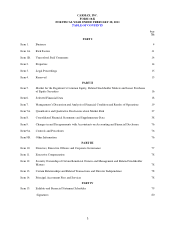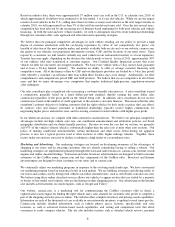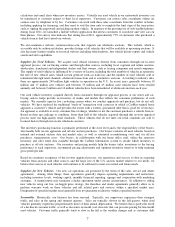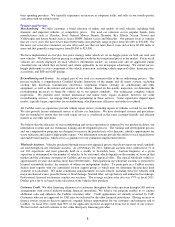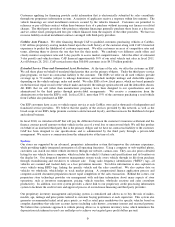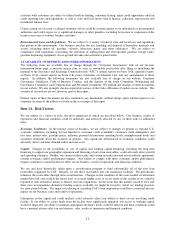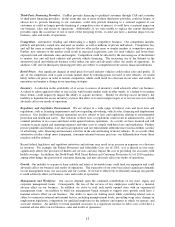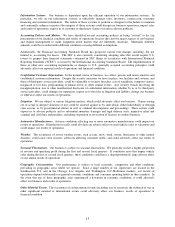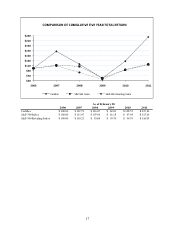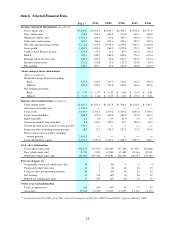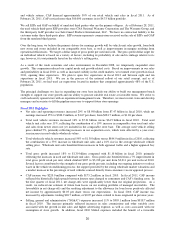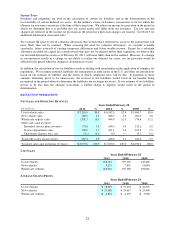CarMax 2011 Annual Report Download - page 22
Download and view the complete annual report
Please find page 22 of the 2011 CarMax annual report below. You can navigate through the pages in the report by either clicking on the pages listed below, or by using the keyword search tool below to find specific information within the annual report.12
Third-Party Financing Providers. CarMax provides financing to qualified customers through CAF and a number
of third-party financing providers. In the event that one or more of these third-party providers could no longer, or
choose not to, provide financing to our customers, could only provide financing to a reduced segment of our
customers or could no longer provide financing at competitive rates of interest, it could have a material impact on
our business, sales and results of operations. Additionally, if we were unable to replace the current third-party
providers upon the occurrence of one or more of the foregoing events, it could also have a material impact on our
business, sales and results of operations.
Competition. Automotive retailing and wholesaling is a highly competitive business. Our competition includes
publicly and privately owned new and used car dealers, as well as millions of private individuals. Competitors buy
and sell the same or similar makes of vehicles that we offer in the same or similar markets at competitive prices.
Further, new entrants to the market could result in increased acquisition costs for used vehicles and lower-than-
expected retail and wholesale sales and margins. Competition could be affected by the increasing use of the Internet
to market, buy and sell used vehicles and provide vehicle financing. The increasing use of the Internet in the
automotive retail and wholesale business could reduce our sales and adversely affect our results of operations. In
addition, CAF and our third-party financing providers are subject to competition from various financial institutions.
Retail Prices. Any significant changes in retail prices for used and new vehicles could reduce sales and profits. If
any of our competitors seek to gain or retain market share by reducing prices for used or new vehicles, we would
likely reduce our prices in order to remain competitive, which could result in a decrease in our sales and results of
operations and require a change in our operating strategies.
Inventory. A reduction in the availability of or access to sources of inventory could adversely affect our business.
A failure to adjust appraisal offers to stay in line with broader market trade-in offer trends, or a failure to recognize
those trends, could negatively impact the ability to acquire inventory. Should we develop excess inventory, the
inability to liquidate the excess inventory at prices that allow us to meet margin targets or to recover our costs would
adversely affect our results of operations.
Regulatory and Legislative Environment. We are subject to a wide range of federal, state and local laws and
regulations, such as licensing requirements and laws regarding advertising, vehicle sales, financing and employment
practices. Our facilities and business operations are also subject to laws and regulations relating to environmental
protection and health and safety. The violation of these laws or regulations could result in administrative, civil or
criminal penalties or in a cease-and-desist order against business operations. As a result, we have incurred and will
continue to incur capital and operating expenses and other costs to comply with these laws and regulations. Further,
private plaintiffs and federal, state and local regulatory and law enforcement authorities have increased their scrutiny
of advertising, sales, financing and insurance activities in the sale and leasing of motor vehicles. If, as a result, other
automotive retailers adopt more transparent, consumer-oriented business practices, our differentiation versus those
retailers could be reduced.
Recent federal legislative and regulatory initiatives and reforms may result in an increase in expenses or a decrease
in revenues. For example, the Patient Protection and Affordable Care Act of 2010, as it is phased in over time,
significantly affects the provision of health care services and may impact the cost of providing our associates with
health coverage. In addition, the Dodd-Frank Wall Street Reform and Consumer Protection Act of 2010 regulates,
among other things, the provision of consumer financing, and may adversely affect our results of operations.
Growth. Our inability to acquire or lease suitable real estate at favorable terms could limit our expansion and could
adversely affect our business and results of operations. The expansion of our store base places significant demands
on our management team, our associates and our systems. If we fail to effectively or efficiently manage our growth,
it could adversely affect our business, sales and results of operations.
Management and Workforce. Our success depends upon the continued contributions of our store, region and
corporate management teams. Consequently, the loss of the services of key employees could have a material
adverse effect on our business. In addition, we strive to staff each newly opened store with an experienced
management team. An inability to build our management bench strength to support store growth could have a
material adverse effect on our business. Our ability to meet our staffing needs while controlling related costs is
subject to numerous external and internal factors, including unemployment levels, prevailing wage rates, changes in
employment legislation, competition for qualified employees in the industry and regions in which we operate, and
associate relations. An inability to retain qualified associates or a significant increase in labor costs could have a
material adverse effect on our business, sales and results of operations.



